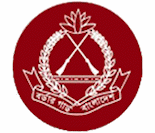Border Guard Bangladesh (BGB)
 Border Guard Bangladesh (BGB) is a paramilitary force known as the "ever vigilant sentinels of the border". BGB is entrusted with the protection of Bangladesh border, anti-smuggling & anti-narcotics operations, prevention of women & children trafficking, prevention of all sorts of trans-border crimes and internal security duties. Since its inception more than 200 years, duties and responsibilities of the force have been increased manifold, as well as operational strategies put on multi-dimensions. The significant changes of the force marked from the history are as follows:
Border Guard Bangladesh (BGB) is a paramilitary force known as the "ever vigilant sentinels of the border". BGB is entrusted with the protection of Bangladesh border, anti-smuggling & anti-narcotics operations, prevention of women & children trafficking, prevention of all sorts of trans-border crimes and internal security duties. Since its inception more than 200 years, duties and responsibilities of the force have been increased manifold, as well as operational strategies put on multi-dimensions. The significant changes of the force marked from the history are as follows:
The Ramgarh Local Battalion started its journey on 29th June 1795 with the name of 'Ramgarh Local Battalion' previously named 'Frontier Protection Force' formed by East India Company in 1794. There were 448 soldiers, two irregular cavalries and only four cannons as the resort of its commencement.
In 1861, 'Ramgarh Local Battalion' was reorganized and renamed as 'Frontier Guards' with 1454 members altogether. The force headquarter was in Chittagong and under command outposts were at Kamrup, Goalpara, Laxmipur, Sylhet and Tripura. In 1879 'Special Reserve Company' of the force was raised for the first time at Peelkhana. In 1891, this force was renamed as 'Bengal Military Police'. A European Subedar commanded the battalion which had four companies located at different parts of Indian subcontinent namely Dhaka, Dhumka, Vagolpur and Gangtok. In 1920, its strength was increased by comprising 16 Platoons and renamed as 'Eastern Frontier Rifles'. Then its primary tasks were to protect the borders and assist in internal security duties.
After partition of the Indian subcontinent, the organization was regrouped and renamed as 'East Pakistan Rifles'. A group of metropolitan armed police of Calcutta and some 1000 ex-soldiers of the then East-Pakistan were merged into this force. Some 3000 Bengali members were also employed in the force. Officers from the army were employed for efficient leadership in the force. In 1958 it was assigned with the tasks of border protection and anti-smuggling duties. The strength of the force increased to 13,454 on 25 March 1971.
This force valiantly played an illustrious role in the historic 'Liberation War' of Bangladesh. On 25 March 1971, Pakistani occupied force attacked erstwhile EPR headquarters at Peelkhana. Then 'Independence Message' from 'Bangabandhu' was transmitted to remote areas of the country through wireless system of its headquarters. Consequently soldiers and people of the country were inspired to confront the Pak-forces. At the beginning of liberation war, Bengali members of the force created strong opposition at Zinjira on the bank of Buriganga on tactical ground.
Later on, almost 12000 soldiers of this force accompanied by other forces and civil freedom fighters fought 9 month long armed-battle under the commands of 11 sectors. Freedom fighters of this force carried out numerous operations like face to face, guerilla fight and suicidal attacks to destroy the dens of enemies. In the 'liberation war' a total of 817 soldiers of this force sacrificed their lives for the nation. Among them 'Shaheed Lance Naek Nur Mohammad Sheikh' and 'Shaheed Lance Naek Munshi Abdur Rouf' bestowed the highest gallantry award 'Bir Sreshtha' for their vast heroism. Among others, 8 martyrs awarded 'Bir Uttam', 32 martyrs awarded 'Bir Bikram' and 78 martyrs awarded 'Bir Protik'.
After the independence of Bangladesh, on 03 March 1972 'East Pakistan Rifles' was renamed as 'Bangladesh Rifles (BDR)'. On 03 March 1980, the Government granted 'National Flag' for the force as the special recognition of its activities. In 2008, the force was awarded the prestigious 'Independence Medal-2008' for its outstanding contribution to the 'Liberation War'.
On 25-26 February 2009, a number of 74 people, including 57 army officers, were brutally killed in an atrocious carnage occurred in the force's headquarters at Peelkhana. Following that grievous mishap, reorganization of the force inevitably came onward. After passing the 'Border Guard Bangladesh Act, 2010' in the Parliament on 08 December 2010, it has come into effect from 20 December of the same year. Honorable Prime Minister Sheikh Hasina, formally raised the flag and opened the monogram of the renamed force on 23 January 2010 to launch as 'Border Guard Bangladesh (BGB)'.
Reorganization activities of the force according to new law are being implemented. The force is effectively discharging the assigned tasks and duties through its 12 Sectors, 47 Battalions and many other Border outposts. BGB as the "ever vigilant sentinels of the border" is sincerely protecting the border, preventing smuggling, human trafficking, trans-border crimes and internal security duties.
|
NEWSLETTER
|
| Join the GlobalSecurity.org mailing list |
|
|
|

